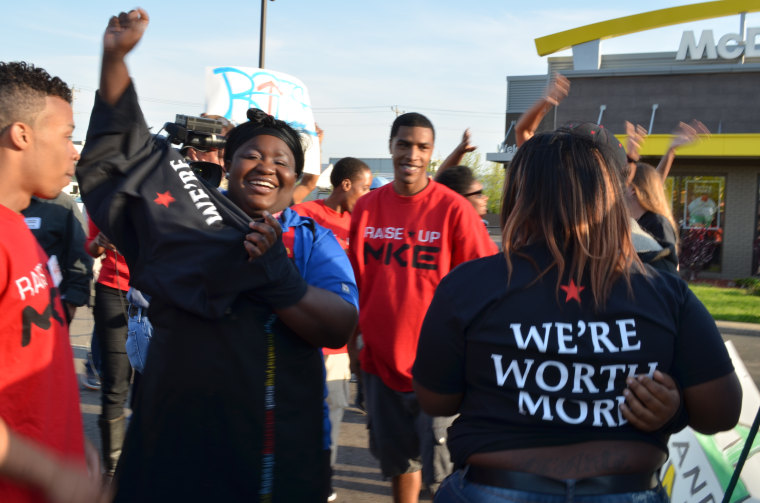The nationwide flood of labor uprisings in the fast food industry hit Milwaukee, Wis., on Wednesday morning when workers at several major fast food and retail chains commenced a day-long strike.
As in other cities where similar strikes have occurred, Milwaukee-based employees at companies such as McDonald's and TJ Maxx are demanding a minimum wage of $15 an hour and the right to form a union. Organizers estimate that by the end of the day, between 150 and 200 workers may have joined the work stoppage.
"I'm for a minimum wage because I want to live comfortably, pay my bills, provide for my daughter and not feel like I can't eat next week...because I spent my money on rent," said Kenny Mack, a maintenance worker at McDonald's who currently earns $10 an hour. He said that he and his 18-month-old daughter had to recently move back in with his mother because he couldn't afford his own housing.
"People can't survive on $7.25, especially with their current hours," he said, referring to Wisconsin's current minimum wage.
In the past several months, similar fast food strikes have occurred in New York, Chicago, St. Louis, and Detroit. Recently, the frequency and intensity of the strikes has increased: The St. Louis and Detroit strikes both occurred in the same week, and the latter was the largest strike yet. Organizers for the more recent strikes have strongly emphasized their desire for a $15 minimum wage, suggesting that the separate campaigns are gradually coalescing into a unified, nationwide call for a wage increase.
"I think workers definitely felt—seeing New York demand $15, seeing other cities demand $15—they felt like that was reasonable," said Jennifer Epps-Addison, the economic justice program coordinator for Citizen Action of Wisconsin.
Two months after the first fast food strike in New York, President Obama used his 2013 State of the Union to call for an increase in the minimum wage from $7.25 to $9.00 per hour. But when Citizen Action of Wisconsin tried to organize workers around a minimum wage hike, "a lot of them said that's not enough," said Epps-Addison.
What does minimum wage buy?
Workers earning $7.25 and working a consistent 40 hours a week earn $15,080 a year—over $400 under the Wisconsin poverty line for a family of two. While a $9 minimum wage would increase that annual income to $18,720, an increase to $15 would make it a full $31,200. That's still barely three quarters of what's needed to comfortably support one adult and one child in Wisconsin, according to the Massachusetts Institute of Technology's Minimum Wage Calculator, but it would be a dramatic upgrade from current conditions.
The other demand—union recognition—was the workers' idea, said Epps-Addison.
"A few weeks previously, they voted and decided they wanted to form their own union, and formed an organizing committee to start building a union campaign," she said. While there was little coordination between that organizing committee and similar committees in other cities, "we've certainly be inspired by what's going on in the country," particularly the most recent strike in Detroit.
Workers and organizers in other cities have also emphasized the organic and locally-driven nature of their own strikes. However, there is some evidence of cross-communication and resource sharing between some of the various organizing committees. For example, the Service Employees International Union, one of America's largest unions, has lent its support and even some of its organizing staff to the campaigns. Additionally, campaign members have occasionally traveled to different cities to meet with one another: Epps-Addison said she had talked to members of the New York campaign, and that Milwaukee workers had gone to meet with their Chicago counterparts.
"Our campaigns aren't coordinated," said Epps-Addison. "We don't have coordinated phone calls or anything, but there's definitely support there. Facebook has been incredible. We've been able to get information in real time. [...] I think that's helped a lot of the groups stay in the same frame of message and learn right away what's working."
The decentralized, networked approach to advocating a $15 wage is in some ways broadly similar to the 19th century labor movement's push for an eight-hour work day. In the aftermath of the Civil War, hundreds of "Eight-Hour Leagues" sprung up across the country, counting farmers, union members, and even the unemployed among their ranks. Last week, Washington Post columnist Harold Meyerson said the labor movement may soon come to resemble "a latter-day version of the Knights of Labor," one of the groups that played an instrumental role in the eight-hour push.
But the fast food strikes never were just about wages, and the demand for more worker power through formal union recognition is still just as central to the campaign. Kenny Mack, the striking McDonald's employee, hinted at the reason why this is the case when he listed the "nastiness of customers' attitudes, [and] managers' attitudes," as a grievance alongside the insufficient wages he receives. As the persistence of civil rights rhetoric around these strikes attests, worker respect and dignity remain a major concern alongside greater compensation.
